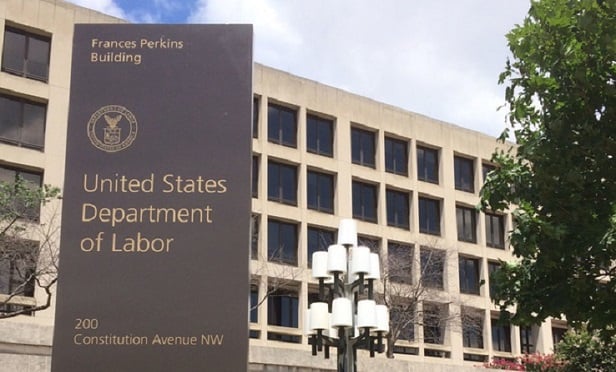
 (Photo: Mike Scarcella/ALM)
(Photo: Mike Scarcella/ALM)
A federal judge in Washington has struck down the Trump administration's association health plan (AHP program regulations.
The U.S. Department of Labor developed the regulations in an effort to ease the effects of the Affordable Care Act (ACA), by giving small businesses and self-employed people a way to join together to form multistate health plans that might be able avoid some of the ACA major medical coverage requirements.
A coalition of 12 states brought the litigation against the Labor Department. The plaintiffs argued that the department's process for promulgating the AHP regulations violated the Administrative Procedure Act. The plaintiffs also argued that the regulations would drive up the cost of health care, by pulling healthier people away from the traditional major medical insurance market.
U.S. District Judge John Bates said in a decision handed down late on Thursday that the regulations violated the Employee Retirement Income Security Act of 1974 (ERISA).
"The final rule is clearly an end-run around the ACA," Bates wrote. "Indeed, as the president directed, and the secretary of Labor confirmed, the final rule was designed to expand access to AHPs in order to avoid the most stringent requirements of the ACA. In short, the final rule exceeds the statutory authority delegated by Congress in ERISA."
An AHP gives the participants a way to team up to join a large group health plan, and to use the ERISA rules that govern large group health plans to escape from the effects of the ACA rules that govern individual and small-group major medical coverage.
Labor Department officials said, for example, that the Mental Health Parity and Addiction Equity Act of 2008, which applies to large groups, would apply to AHPs. But officials said the ACA essential health benefits rules, which set minimum standards for individual and small-group major medical policy benefits packages, would not.
In theory, for example, an AHP might be able to choose to cover inpatient hospital care, but not prescription drugs.
That goes against the intent of the ACA, the 12 states that oppose the new AHP regulations argued in their lawsuit last year.
Congress put the EHB provisions in the ACA to ensure that health plans included certain health benefits, the 12-state coalition said.
The Labor Department wants to let self-employed individuals with no employees define themselves as both the employer and the employee. That would contradict the definition of group health plans under ERISA, the coalition argued.



